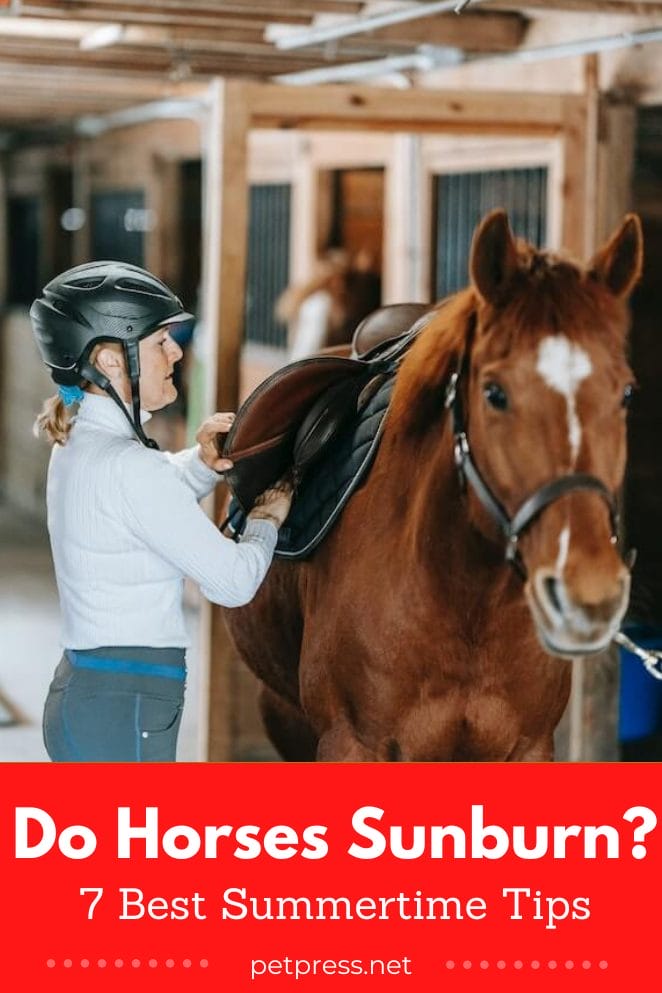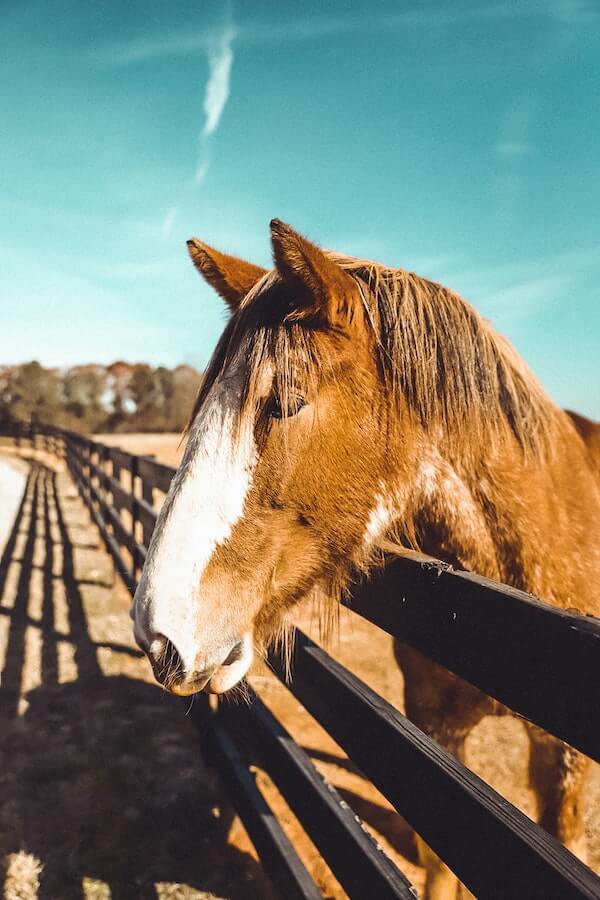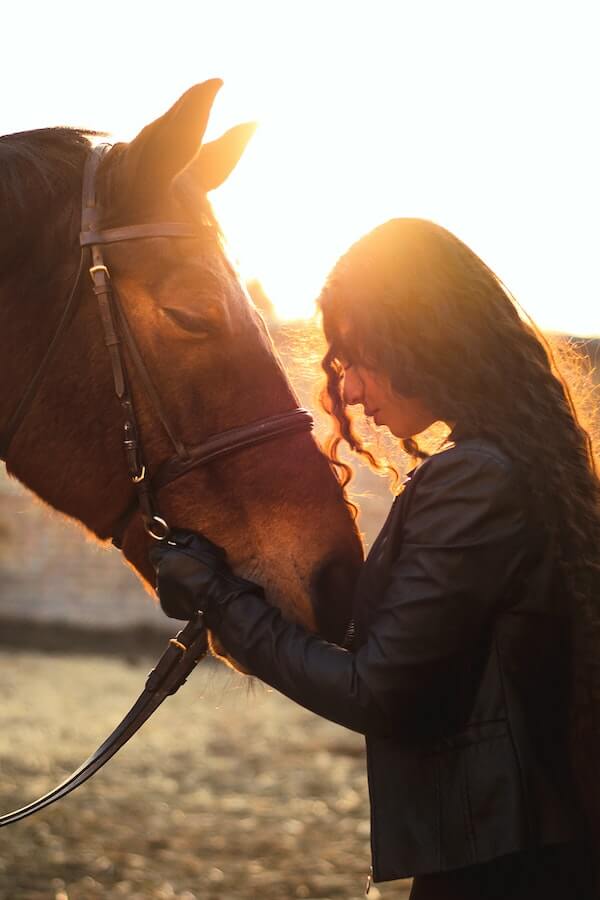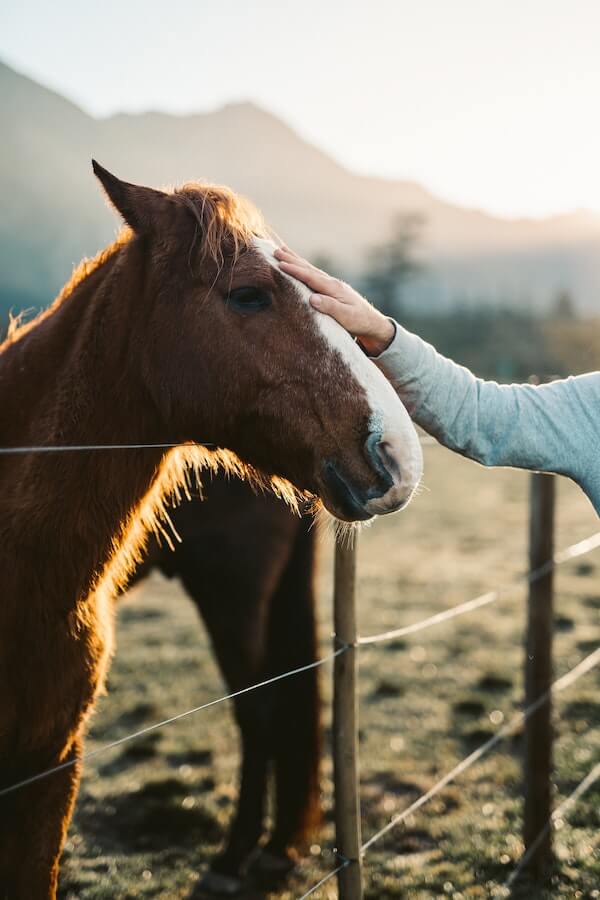
Ah, the noble horse. They can travel far and wide, never tire, and are always up for a good gallop. But do horses sunburn?
Horses, just like humans, can be susceptible to sunburn if exposed to too much direct UV radiation without protection. Their skin is photosensitive.
However, due to their thick coats and overall size, horses are not as likely to burn as quickly or severely as we humans.
So as per basic horse care tips, it is important to keep an eye out for signs of sunburn in our equine friends.
What is photosensitization in horses?

Photosensitization in horses occurs when their skin is exposed to sunlight after being exposed to certain chemicals and toxins.
When these substances build up in the horse’s body, they can be activated by ultraviolet light from the sun which causes an inflammatory reaction.
Signs of photosensitization include reddening of the skin, crusty scabs, and lesions on light-colored areas such as around the eyes and muzzle, on white socks or blazes, under manes and tails, etc.
Photosensitization can occur due to the ingestion of plants containing compounds called furocoumarins (including St. John’s Wort, bracken fern, and ragwort) or due to the consumption of certain antibiotics, tranquilizers, and antifungal drugs.
It can also be caused by health conditions such as liver disease or Jaundice (which causes a buildup of bilirubin in the bloodstream).
While photosensitization may not necessarily harm your horse’s health — other than causing some discomfort — it is still important to pay attention to any symptoms and take steps to prevent further exposure.
Limit your horse’s access to plants known to trigger photosensitization and talk with your veterinarian about medications that could potentially cause an unpleasant reaction when exposed to sunlight.
How do you know if your horse is sunburned?

Even with their thick coats, horses are susceptible to sunburn. But how do you know if your horse has too much of the summer sun? Here are five telltale signs of a sunburnt equine:
1. Reddish or pink skin
Do an inspection and look for areas on your horse’s coat that have changed color from usual. This can range from a faint rosiness to bright red patches.
2. Blistering
Sunburns can cause blisters in particularly sensitive areas like the muzzle, eyes, ears, and hoofs of the horse. These should be checked regularly as they can cause discomfort or even infection if left untreated.
3. Hair loss
Excessive exposure to sunlight can lead to sunburned skin which can eventually result in bald patches on the horse’s coat where the hair has been burned away.
4. Crusty patches
The affected areas of the horse’s body may become scaly, thickened, and leathery as a result of sunburn. In extreme cases, these patches may be painful for your horse and should be treated by a veterinarian as soon as possible.
5. Skin lesions
Whether from prolonged exposure to sunlight or from an allergic reaction, certain horses may develop skin lesions (raised bumps) as a result of their sunburns.
So, if your horse has any of these telltale signs of sunburn, it’s time to take some extra steps to protect them from the sun’s harmful rays. Do your part and help keep your horse cool and comfortable in the summer months!
Treating sunburn in horses

Horses can suffer from sunburn too, with some breeds more prone to it than others. So how can you help treat your horse’s sunburn? Here are five ways:
1. Sunscreen:
If a horse is particularly sensitive or spends a lot of time outdoors in the summer months, then applying sunscreen specifically designed for horses may be beneficial. Be sure to use one that offers both UVA and UVB protection.
2. Shelter:
Horses should always have access to shelter when outside during prolonged periods such as grazing or turnout during hot days and especially when the UV index is high. Ensure there is plenty of shade for your horse to move around in and be sure to check the temperature as even cooler temperatures can still cause sunburn.
3. Cover Up:
If possible, cover up your horse with light-colored sheets or blankets during hot days and when they are out in direct sunlight. This will help protect their skin from UV radiation while also keeping them cool.
4. Drink Up:
Provide plenty of fresh, clean water throughout the day to keep your horse hydrated which helps the skin heal itself faster should it be exposed to too much sun.
5. Ointment:
Treat sunburns with a special ointment designed specifically for horses – this can help soothe and protect the skin while speeding up recovery.
Of course, prevention is always better than cure and it’s important to pay attention to your horse’s exposure to the sun and make sure you are taking all the necessary steps to keep them healthy and safe at all times. If the sunburn is severe then you must definitely take a trip to the vet to rule out any probable danger.
Horse breeds that are prone to sunburn
Some breeds are more susceptible to sunburn as compared to others. Here’s a list of five horse breeds that may get sunburned fast:
1. Appaloosa: This unique-looking white horse breed often has large patches of unpigmented skin—which is susceptible to sunburns. Be sure your Appaloosa has plenty of UV protection when out in the sun!
2. Paint Horse: With its distinct coat pattern, the Paint Horse suffering from sunburn can be hard to spot. However, it’s important to watch for signs such as reddened skin and peeling of the coat.
3. Quarter Horse: This famously muscular breed is prone to sunburn as well. Be sure to use sunscreen on your horse when you take them out for a ride in the summer!
4. Arabian: This ancient breed is known for its high energy levels and its unique beauty—but it’s also susceptible to sunburns due to its thin skin.
5. Thoroughbred: The Thoroughbred is one of the tallest horse breeds in the world, but they can also be susceptible to sunburns due to their light-colored coats. Make sure your horse has plenty of UV protection when out in the sun!
Conclusion
In summary, yes, horses can get sunburned! That’s why it’s important to take the necessary precautions when it comes to protecting your horse from the sun.
Use sunscreen and apply liberally, give them plenty of shade, and make sure they have lots of water available!
With a little bit of extra care, you can ensure that your horse stays healthy and happy all summer long.
- 7 Dog Breeds With Webbed Feet And Why Do They Have Them - July 19, 2023
- 10 Best Fish For Small Tanks That Make Perfect Pets - July 18, 2023
- How to Breed Guinea Pigs: A Detailed Guide - July 17, 2023


GIPHY App Key not set. Please check settings